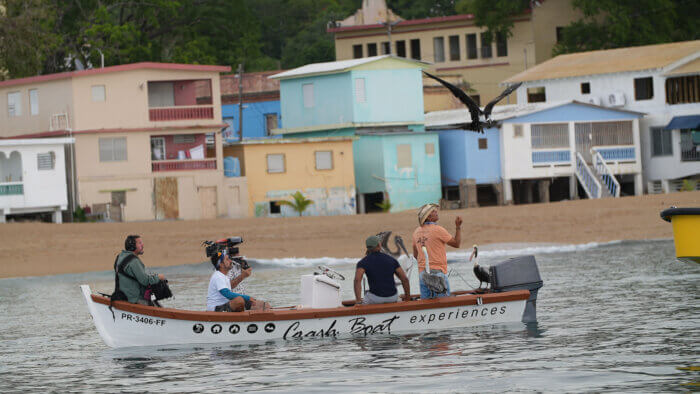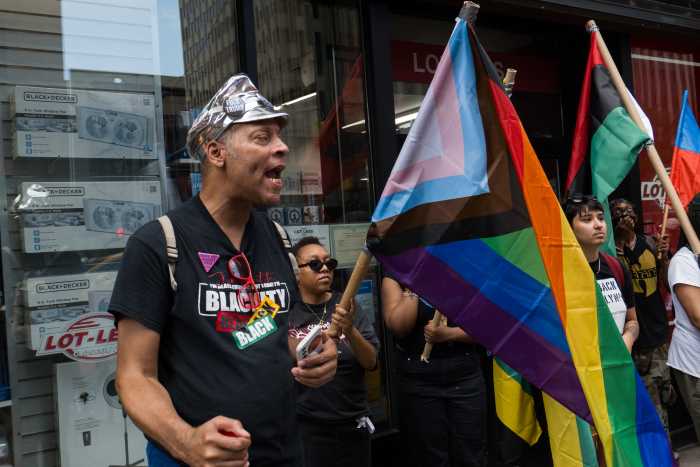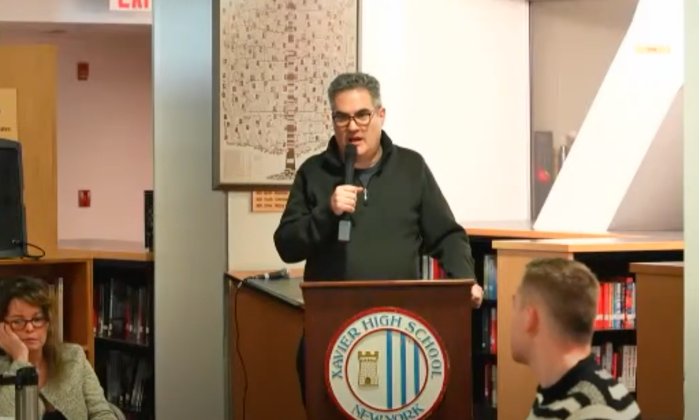Christian Cooper has much to be proud of this summer: He has a new TV show and book out exploring his love of birding and his identity as an out gay Black man.
Random House published his memoir, “Better Living Through Birding: Notes from a Black Man in the Natural World,” June 13. The book was followed by the June 17 premiere of National Geographic Wild’s “Extraordinary Birder,” a six-episode series focusing on Cooper in places ranging from Central Park (the scene of the infamous “Central Park Karen” incident) to Hawaii. The series has been streaming weekly on Nat Geo Wild and Disney+.
Cooper suggested people listen to the audiobook, “Better Living Through Birding,” which has some bird songs from the Cornell Lab of Ornithology as well as his own bird calling between his life story and passion for and observations of birds and humans.
Cooper, a writer, editor, and communications specialist who formerly worked at Health Science Communications and Marvel Comics is finding himself in a whole new career hosting a TV show about his lifelong passion birdwatching.
It’s a far cry from the viral video that launched him into the spotlight in 2020.
Gay City News spoke with Cooper about his hobby, identity, and experience and starting a new chapter of his career at 60 years old.
The Central Park Karen incident
On May 25, 2020, Cooper was out birdwatching in The Ramble, a semi-wild section of Central Park, early in the morning. That morning, Amy Cooper (no relation) was out walking her dog unleashed in the area where dogs are required by city law to be on a leash. Christian Cooper asked Amy Cooper to leash her dog, but she refused. Christian Cooper started recording the disagreement between them, during which Amy Cooper called the police claiming an African-American man was threatening her.
The incident catapulted both Coopers into the limelight. In Amy Cooper’s case, she was ostracized by the public, which quickly dubbed her the “Central Park Karen.” Her life has been on a downward spiral ever since, as she lost her job and became embroiled in legal trouble.
However, Amy Cooper has remained publicly defiant defending her actions.
In Christian Cooper’s case, the incident transformed his hobby into a career beyond his wildest dreams.
For his part, Christian Cooper has demonstrated grace towards Amy Cooper. He repeatedly publicly stated that he has been uncomfortable with the retribution she received and publicly called for an end to the death threats against her, according to CNN. Christian Cooper has consistently stated he is more interested in focusing on the underlying racism of Amy Coopers’ actions than the person, Amy Cooper.
Opportunity
As soon as the video went viral and the media frenzy began, Cooper turned the incident in Central Park into a teachable moment.
“The incident happened, all these microphones and cameras got stuck in my face,” he said. “I’m like, if they are going to stick all of these microphones and cameras in my face, I’m going to use them.”
He added: “I have always been about basically three things, justice for Black people, equality for queer people, and wild birds for all people,”
Cooper knew he was gay when he was five years old, but also knew that it wasn’t accepted. Cooper came out when he was 17 years old in 1981.
“I always liken it to being buried alive,” he said. Being in the closet was “the ultimate imprisonment.”
“It’s not that I’m doing anything different than I was doing before,” he added. “It’s just that I’m doing it on a bigger platform so I can reach more people.”

A lifelong member of Audubon New York and a board member of NYC Audubon, Cooper has volunteered for the organization’s New York State-based program, For the Birds, working with youth to get them out of the classroom and into nature to learn about birds. The program only lasts for a semester, so more than 20 years ago, he created NYC Audubon’s Feathered Friends afterschool program for young people to continue their interest in birding after their semester with For the Birds.
The program, for which he continues to volunteer today, is important to him to provide visibility and opportunity to New York City kids, especially kids of color.
“It’s really hard to imagine oneself doing something, being something, if you never have seen someone else in that role in the world,” Cooper said. “I’m very hopeful that this being maybe the first ever big birding show on mainstream television — and led by a Black person — that people will look at that, Black people will look at that, Black kids will look at that and say, ‘Oh, maybe I can do that too.’ And they sure as heck can.”
A former comic book writer and editor for Marvel Comics, Cooper also went back to his previous career to pen a comic, “It’s a Bird,” based on the Central Park incident and the everyday experiences of Black people in the world. The comic was a part of DC Comics’ “Represent!,” a series showcasing underrepresented communities, such as people of color and queer people, in comics.
In the 1990s, Cooper was Marvel’s first openly gay editorial employee and was an editor for the comic, “Alpha Flight,” which introduced Marvel’s first openly gay character, Northstar. Cooper said it is “great” that comic books have caught up with the readers and movements showing diversity.
Inspired by Cooper and the incident, the National Audubon Society launched Black Birders Week, a virtual event showcasing Black scientists, researchers, and nature enthusiasts, Audubon Magazine reported.
A whole new chapter
Cooper celebrated the launch of “Extraordinary Birder” at a watch party with friends.
“It was fun to see their reaction,” he said, stating that he was surprised to learn about their favorite parts of the show.
Born in New York and raised in Long Island along with a sister, Cooper was given his first pair of binoculars by his father when he was 10 years old. His father taught high school biology and elementary school general science, and he indulged his children’s interests.
“My dad saw the light in my eyes about birds,” Cooper said. “As soon as he saw my interest, he made it his business to sort of nurture it.”
Cooper recalled wondering what kinds of crows had a red patch on their wings. The crow turned out not to be a crow at all. It was a red-winged blackbird. That bird, he explained, was what birders like to call his “spark bird.”
His interest continued with the Bermuda Longtail that he saw during his family’s vacation to Bermuda. Now he is equipped with a wealth of knowledge about birds, allowing him to translate the bird world to the human world.
“If you can communicate your passion and enthusiasm about nature and birds to a bunch of fifth graders, then being on TV is no problem,” he said with a laugh.
“Extraordinary Birder” naturally begins at the site of the incident, Central Park’s The Ramble, and Cooper’s hometown, New York City. In the first episode, he also climbs the George Washington Bridge, visits the city’s only bird rescue shelter, and explores how the city’s Javits Center became a model for birds and humans living together in the metropolis.
“They are, I think, some of the finest corporate citizens, if you want to put it that way, in the city of New York,” Cooper said of the center that once was “probably one of the biggest bird killers in the city.” The center replaced its windows with special bird windows that the birds can see and changed its roof into a Herring gull habitat and rest stop for an estimated 200 species of migrating birds.
“Now they’re a shining model example” for New York City, which is “a migratory hotspot,” he said.
In this season of the show, Cooper leaves the Big Apple and travels to Alabama, Hawaii, Palm Springs, Puerto Rico, and Washington DC.
Alabama is “the most important” episode of the season for Cooper. His family has lived in the north for generations. They moved north during one of the waves of the Great Migration, when an estimated six million Black Americans moved North to escape racism and seek economic opportunity between 1910 and the 1970s.
Cooper can trace his father’s side of the family back to Alabama, but he had never been to Alabama until the show took him to The Cotton State.
“It was such an interesting experience and seeing the ways in which there are parallels between birds and the Black experience,” said Cooper, noting that Harriet Tubman not only freed an estimated 700 enslaved African Americans on the Underground Railroad, but also served as a Union spy during the Civil War and used “birdcalls as a means of communicating surreptitiously.”
Cooper drew parallels between the northern journeys of both Black Americans and birds, saying they both have migrated to give their children a better life.
“It’s the same phenomenon just on a different scale,” he said.
Birds “are the ultimate symbol of freedom,” he explained, because of their “ability to move through the air” and can fly anywhere in the world. “I think that’s why birds have grabbed me all my life.”
“It speaks to me on both levels as a Black man and a gay man,” Cooper explained.
Taking flight
Cooper estimates there are about 10,000 different bird species in the world. There is enough material for at least 10 seasons, if not 20 seasons, he said.
Cooper is not sure how long “Extraordinary Birder” will be streaming, but he’s prepared to keep it up.
“It’s been an interesting, fun journey,” he said. “I hope we get a second season and get to do it some more.”



































